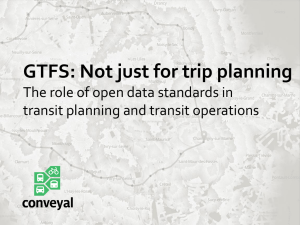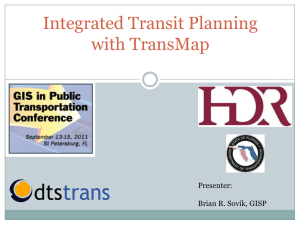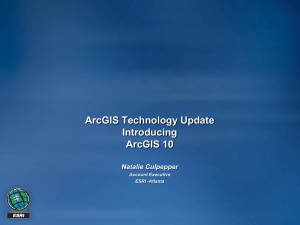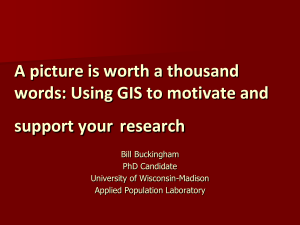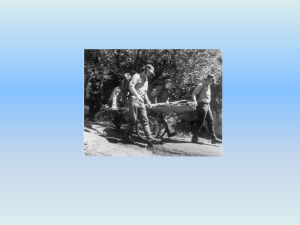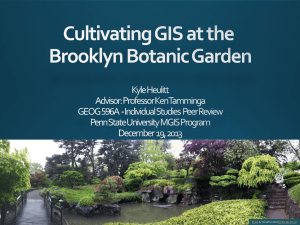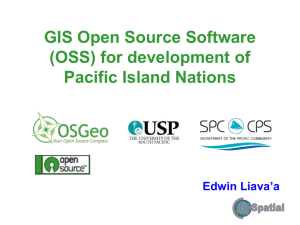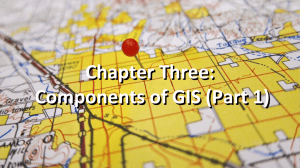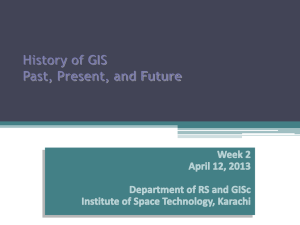The Use of Web-based GIS Tools & GTFS to Support Transit
advertisement
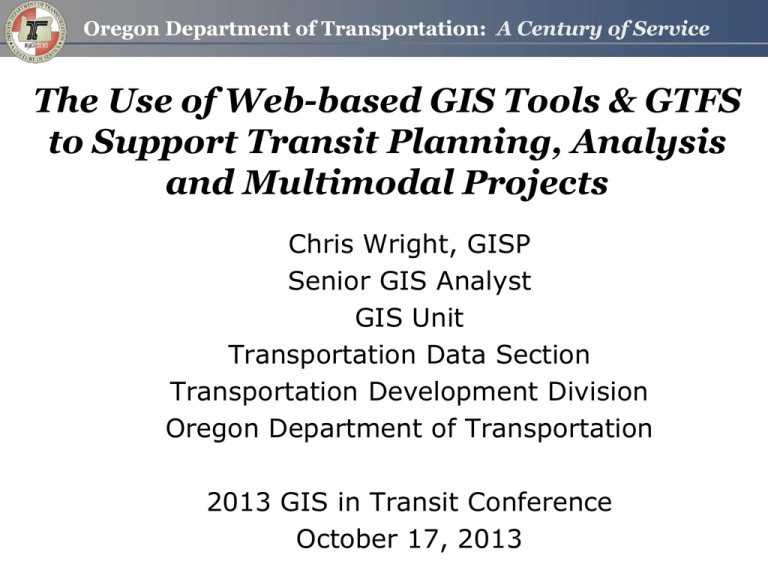
The Use of Web-based GIS Tools & GTFS to Support Transit Planning, Analysis and Multimodal Projects Chris Wright, GISP Senior GIS Analyst GIS Unit Transportation Data Section Transportation Development Division Oregon Department of Transportation 2013 GIS in Transit Conference October 17, 2013 Presentation Outline • • • • Intro to Oregon, ODOT, Transit & GIS GTFS & Existing tools Challenges faced Current & future opportunities Oregon Transportation Plan 2006 The Goal – “Provide a balanced, efficient and integrated transportation system that ensures interconnected access to all areas of the state, the nation and the world. Promote transportation choices that are reliable, accessible and cost-effective.” - Oregon Transportation Commission Economy & Jobs Policy Vision April 2012 “Transportation should balance pedestrian, transit and auto access to reduce dependence on autos and provide secure, convenient and affordable mobility for all citizens.” - Governor John Kitzhaber Oregon Population 3,831,074 2010 Census 4,250,000 Projected 2020 Population Fixed Route Bus Service and Amtrak Amtrak Rail Amtrak Cascades Thruway Bus Fixed Route Amtrak Cascades / Rail Fixed Route 6 Statewide Regions Rides Population Region 1 1,663,382 Population 116,325,153 Rides Region 2 1,201,571 Population 19,115,154 Rides Region 4 324,583 Population 1,394,026 Rides Region 3 474,584 Population 1,972,389 Rides Region 5 166,954 Population 322,385 Rides Transportation Mode Split Goal: Decrease Drive Alone 10% by 2020 GIS, Transit & TAPU Transit: - Grants - Coordination with Transit providers GIS: - Enterprise data - Application Dev - Maps GTFS TAPU: - Travel modeling for MPOs General Transit Feed Specification (GTFS) GTFS defines a common format for public transportation schedules and associated geographic, fare, and service calendar information. GIS & GTFS = Efficiency • The analytical work we do using GIS tools enable us to effectively meet our goals associated with optimal use of our highway system to safely and efficiently move people and goods. In times of shrinking resources, we can do more with less by utilizing GIS tools. The GTFS will help us do that. • - Becky Knudson, Senior Transportation Economist with the Transportation Analysis and Planning Unit 12 Gaps in Service Areas GIS Tools Used • ESRI JavaScript API: TransGIS, ODOT’s Enterprise web GIS tool and development framework • ArcGIS Online: Zero IS overhead, quick to deploy, but limited customization • ArcGIS Desktop: Custom plots & analysis • FME: Data merging & validation GTFS Data Prep - FME GTFS in TransGIS GTFS in ArcGIS Online Existing Challenges • Which tool to use (TransGIS, FACSSTIP, ArcGIS O…) ? • Data quality.. Tri-Met vs. the rest • Integration with Legacy ODOT systems Future Opportunities • Existing research project to develop statewide Transit Analyst tool (Open Trip Planner) • Apps & open source • Heightened collaboration between business lines (Transit, Highway, Planning, Maintenance..) • Evaluating “pop-up” ride share locations on ODOT ROW Web tools – Externally Accessible • TransGIS: https://gis.odot.state.or.us/transgis/ • ArcGIS Online: https://odot.maps.arcgis.com/home Thank you! Chris Wright, GISP 503-986-3726 Chris.wright@odot.state.or.us Special thanks to: Matthew Barnes Chad Crockett Dan Warren
